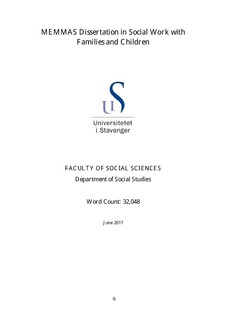| dc.description.abstract | This was a pioneer study among Ugandan immigrants in Norway, aimed at exploring their parenting experiences. Particularly; their perceptions on factors which inform and influence parenting orientations, how cultural shifts are negotiated as well as opportunities and challenges associated with parenting within the Norwegian context.
A qualitative study of narrative inquiry was conducted, complemented by microethnography under the paradigm of social constructivism. Six participants (4 female and 2 male) were purposively sampled through snowballing, under the criteria that the immigrant parents are Ugandan and have resided in Norway for more than 3 years and have children below 18-years, born prior or post migration. The study employed a thematic narrative analysis underpinned by ecology, cultural, social capital and acculturation theoretical perspectives. Findings showed that parenting experiences constituted a mixture of both lived and told experiences, legitimised in the dynamics of storytelling. The study revealed insights on transnational parenting practices. Findings showed that participants kept emotional, social, and economic ties with Uganda, in addition to drawing selectively and instrumentally from the Norwegian context to acquire a balance. Further, it was accentuated that regardless of differences in cultures, the desired end goal of parenting is the same, though it’s the means that are debatable, as the end goal can be achieved through different cognitions and practices. Paradoxically differences in sociocultural values, norms, and practices, turn into a sameness that excludes others.
The study had implications for social work theory and practice, regarding the impact of cultural assumptions on perceptions, behaviours, and interventions. Consistent with previous studies on parenting in an intercultural context, this study concluded that parenting is complex and dynamic. Despite adapting, participants’ narratives revealed struggles in reconciling the Norwegian and Ugandan cultural values and norms. They faced a dilemma in maintaining their cultural identities of origin, at the expense of inhibiting their children from integrating into the Norwegian society. Disparities in acculturation between parents and children created tensions. In turn, this accounted for interventions by the Norwegian Child Welfare Services, when expectations of modelling behaviour in accordance to respective values and norms were not met. | nb_NO |

